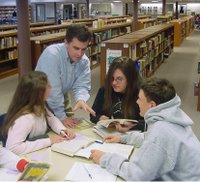Where am I supposed to sit in the 21st Century classroom?
If you walked past F14 today, you would have seen me sitting in the middle of the room, hunched over several sheets of paper. All around me, kids were talking to each other. And that's just how I planned it.
My classroom has looked like that for several years. But now, things have begun to change. Or shift. What does that mean for me? Where do I sit in this new digital classroom? And what am I supposed to do?
Today I sat right in the center for most of the class, but nobody talked to me. It was a Literature Circle discussion day. Translation: students come in having read the first part of their novels (each group broke up their novel into four parts) and spends most of the class in small groups, sharing ideas about the book. I sit in the middle, trying to listen to pieces of as many conversations as possible. Snippets of discussions. Pieces of ideas. All the while, I'm jotting down feedback on an assessment sheet. A few minutes before the bell rings, I distribute the marked up sheets to the student groups. For me, it's kind of a hands-off approach to the lesson. I rarely interject myself into a group's conversation. Too often I find that if I float around the room, my arrival at a group usually means a quick shuffling of papers and comments like, "...so anyway, as we were discussing [insert any out of context reference to a character or literary term meant to sound intelligent] what are your thoughts..." Then it all conveniently tails off as I continue past. Or another dreaded interaction: "Hey, Miller, what does this mean?" Once that happens, I become the crutch. What do students need to think for if they can just ask the teacher for the answers?
From the center, there is no opportunity to show off for me or wait for me to show up. Am I able to hear every snippet of their conversation? No. Do I need to? I don't know. I guess the answer depends on what my role as a teacher is. Is it to guide students to certain pre-determined points in the curriculum (ie the use of similes and figurative language in The House on Mango Street). If so, then I do need to hear almost everything students have to say. After all, if they're discussing Esperanza's feelings of shame about her surroundings, rather than examining the unique use of similes, it's my job to get them back on track. But I don't think that's my role. Who is supposed to decide what the students know and learn?
But toss in something brand new in the form of our 21st century collaborative tools - wikis, blogs, social networking - and I think I'm still confused. Where should I sit? Right now, I'm at my computer, reading some of the ideas posted by my English 10 students on the Literature Circles wiki. Again, I'm trying to keep a respectful distance and let the students do the talking. Just like when we were all in room F14 together this morning, the students are sharing ideas, putting their thoughts out there, and asking questions. Is one more pedagogically sound than the other?
Dozens of edubloggers with a lot more experience and knowledge than me have weighed in on the future of our schools. Will Richardson, in a typical insightful, big picture way, says, "We need to unlearn the premise that we know more than our kids, because in many cases, they can now be our teachers as well. We need to unlearn the idea that learning itself is an event. In this day and age, it is a continual process." Some, like Daniel Kinnaman question whether the need for a traditional classroom is still valid, while Scott Mcleod has pointed to the need to seriously rethink the physical school setting. There is a telling exchange of comments on a post by Clay Burrell that seems to hit on some of the same issues I'm confronting. Stephen Lazer wonders if moving towards a full digital connected model worth it because the "physical space of school is in some cases the only time my students get to exist for themselves (and therefore, get to try out being their selves)." Clay's take is that maybe it's not just about swapping one kind of school setting for another, but rather a rethinking of broader social and community relationships. "Community centers? Public parks? There are many non-schoolbuilding sites that could create getaways from home for learning purposes that are much more real and relevant than a classroom with a bell."
I don't know if I'm there yet. For now, I'll keep showing up at F14. So will the kids. We'll see where it goes from there.






No comments:
Post a Comment